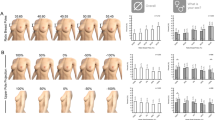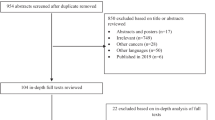Abstract
Background
Breast cancer is one of the most common female “malignancies” reported worldwide in recent years. This study is aimed to understand the degree of acceptance of breast reconstruction among breast cancer patients in Chinese women and to explore the related factors.
Methods
Breast cancer patients were asked to fill in the demographic questionnaire, and consent for evaluation of Breast Reconstruction Acceptance Scale, Social Support Scale, and Functional Assessment of Cancer Therapy-breast Quality of Life Instrument (FACT-B). The data were assessed using multivariate logistic regression analysis for the correlations between the degree of acceptance of breast reconstruction and age, marital status, family monthly income, quality of life, and social support.
Results
57.5% of 715 patients were not familiar with breast reconstruction. Results showed correlation with the degree of acceptance of breast reconstruction. Multivariate analysis indicated that age (41–50 years old, OR: 0.25, 95% CI: 0.08–0.76; > 50, OR: 0.05, 95% CI: 0.02–0.15), marital status (married, OR: 0.15, 95% CI: 0.05–0.43; divorced/widowed, OR: 0.11, 95% CI: 0.03–0.42), family income (3–10 thousand RMB, OR: 2.01, 95% CI: 1.08–3.76; > 10 thousand RMB, OR: 2.14, 95% CI: 1.05–4.37), quality of life (fair, OR: 0.59, 95% CI: 0.39–0.91), and social support (excellent, OR: 0.50, 95% CI: 0.30–0.83) were all correlated with the degree of acceptance of breast reconstruction.
Conclusion
Chinese breast cancer patients have a low degree of acceptance of breast reconstruction. The degree of acceptance was found to be correlated with age, marital status, family monthly income, quality of life, and social support.
Level of Evidence IV
This journal requires that authors assign a level of evidence to each article. For a full description of these Evidence-Based Medicine ratings, please refer to the Table of Contents or the online Instructions to Authors www.springer.com/00266.
Similar content being viewed by others
References
Yang L, Li LD, Chen YD et al (2006) Time trends, estimates and projects for breast cancer incidence and mortality in China. Zhonghua Zhong Liu Za Zhi 28:438–440
Lee BT, Duggan MM, Keenan MT et al (2011) Commonwealth of Massachusetts Board of Registration in Medicine Expert Panel on immediate implant-based breast reconstruction following mastectomy for cancer: executive summary, June 2011. J Am Coll Surg 213:800–805
Li W, Piao H, Qu D et al (2011) Assessment of quality-of-life influence of immediate or delayed autologous breast reconstructions. Cancer Res Prev Treat 2011:535–538
Epstein S, Tran BN, Cohen JB et al (2018) Racial disparities in postmastectomy breast reconstruction: national trends in utilization from 2005 to 2014. Cancer 3:1–11
Mu L, Xin M, Luan J (2011) Valuation on and the current study status of breast reconstruction following breast cancer surgery. Chin J Breast Dis (Electronic Version) 2011:215–221
Zhang X, Zhang P, Chen J (2010) Investigation of approval degree of breast conserving therapy and breast reconstruction of women with breast diseases. Chin J Bases Clin Gen Surg 2010:1240–1244
Zhao R, Qiao Q, Yue Y et al (2003) The psychological impact of mastectomy on women with breast cancer. Chin J Plast Surg 19:294–296
Chen H, Du Y, Jia G (2003) Factor analysis is applied in the test of family burden scale structure validity. Chin J Health Stat 20:93–94
Xiao S (1994) The theoretical basis and application of social support rating scale. J Clin Psychiatry 2:98–100
Brady MJ, Cella DF, Mo F et al (1997) Reliability and validity of the functional assessment of cancer therapy-breast quality-of-life instrument. J Clin Oncol 15:974–986
Wan CH, Zhang DM, Tang XL et al (2003) Introduction on measurement scale of quality of life for patients with breast cancer: Chinese version of FACT2B. Chin Mental Health J 17:298–300
Lee CN, Belkora J, Chang Y et al (2011) Are patients making high-quality decisions about breast reconstruction after mastectomy? Plast Reconstr Surg 127:18–26
Kruper L, Holt A, Xu XX et al (2011) Disparities in reconstruction rates after mastectomy: patterns of care and factors associated with the use of breast reconstruction in Southern California. Ann Surg Oncol 18:2158–2165
Brennan ME, Spillane AJ (2013) Uptake and predictors of post-mastectomy reconstruction in women with breast malignancy–systematic review. Eur J Surg Oncol 39:527–541
Levine SM, Levine A, Raghubir J, Levine JP (2012) A 10-year review of breast reconstruction in a university-based public hospital. Ann Plast Surg 69:376–379
Charavel M, Bremond A, Courtial I (1997) Psychosocial profile of women seeking breast reconstruction. Eur J Obstet Gynecol Reprod Biol 74:31–35
Zhao R, Qiao Q, Yue Y et al (2003) The psychological impact of mastectomy on women with breast cancer. Zhonghua Zheng Xing Wai Ke Za Zhi 19:294–296
Jeevan R, Mennie JC, Mohanna PN et al (2016) National trends and regional variation in immediate breast reconstruction rates. Br J Surg 103:1147–1156
Author information
Authors and Affiliations
Corresponding author
Ethics declarations
Conflict of interest
The authors declare that they have no conflict of interest.
Research Involving Human Participants
All procedures performed in studies involving human participants were in accordance with the ethical standards of the institutional and/or national research committee and with the 1964 Declaration of Helsinki and its later amendments or comparable ethical standards.
Informed Consent
Informed consent was obtained from all individual participants included in the study.
Electronic supplementary material
Below is the link to the electronic supplementary material.
Rights and permissions
About this article
Cite this article
Gong, F., Ding, L., Chen, X. et al. Degree of Acceptance of Breast Reconstruction and the Associated Factors Among a Population of Chinese Women with Breast Cancer. Aesth Plast Surg 42, 1499–1505 (2018). https://doi.org/10.1007/s00266-018-1171-5
Received:
Accepted:
Published:
Issue Date:
DOI: https://doi.org/10.1007/s00266-018-1171-5




